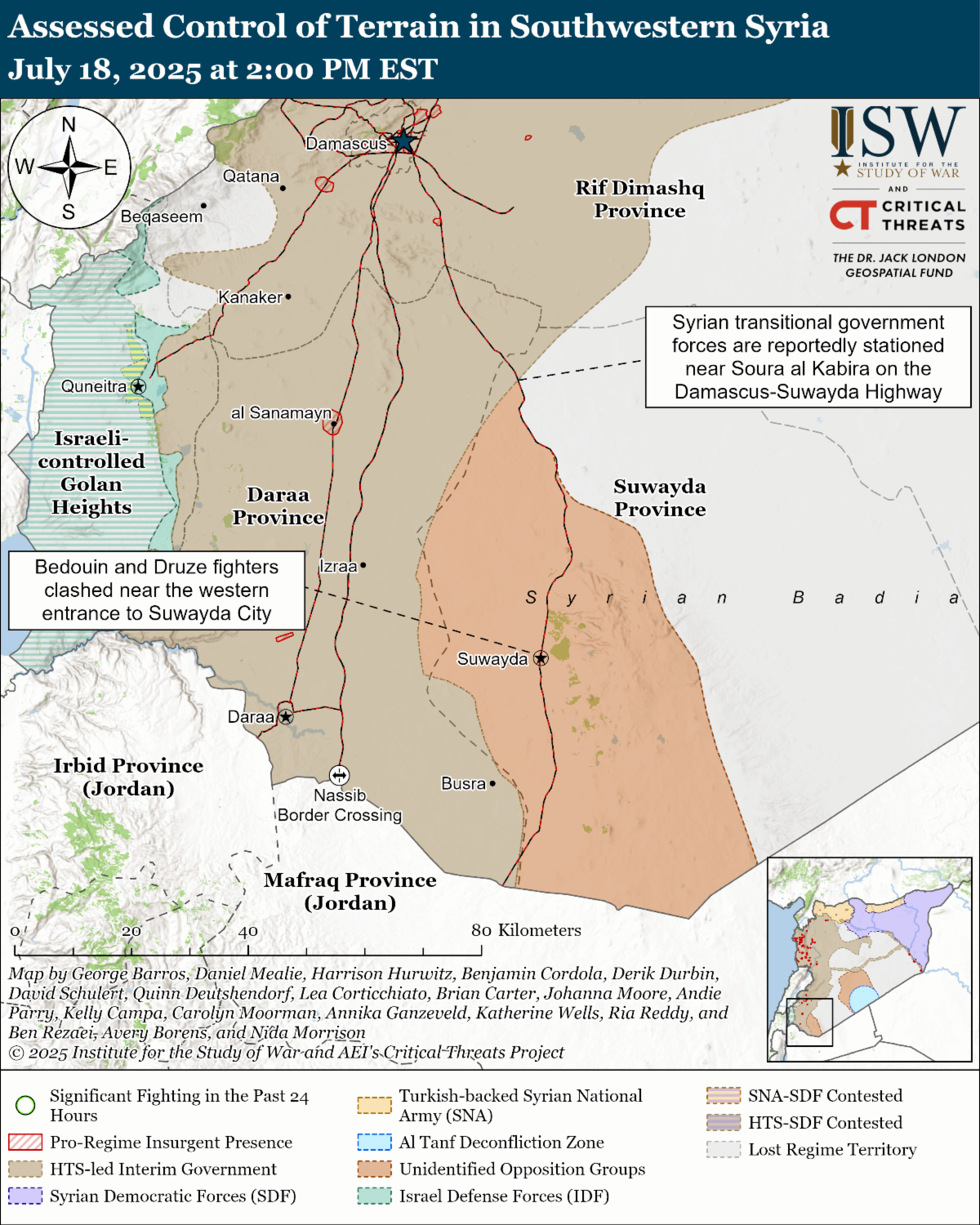Israel reversed its previous demand that Syrian transitional government forces refrain from intervening in Suwayda Province, southern Syria. An unspecified Israeli official reported on July 18 that Israel will “allow” a limited number of Syrian transitional government forces to enter Suwayda for the next 48 hours to restore stability. Syrian transitional government forces withdrew from Suwayda Province on July 17 after Israeli airstrikes conducted "to protect” the Druze inflicted heavy losses on transitional government forces. Israeli Prime Minister Benjamin Netanyahu said on July 16 that Israel would continue to enforce its demand for a demilitarized Syria south of Damascus. Bedouin clans across Syria exploited the security vacuum created in the withdrawal of government forces and deployed to Suwayda to fight Druze militias that are conducting retaliatory killings against Bedouins. These killings by Druze militias are retaliation for the atrocities committed against the Druze in Suwayda by predominantly Sunni militias over the last week. Fighting between factions and attacks on civilians has intensified across Suwayda Province since the government forces withdrew on July 17.
Syrian transitional government forces are reportedly stationed on the outskirts of Suwayda Province. It is unclear if Syrian government forces have entered Suwayda at this time. Syrian media reported on July 17 that Syrian government forces are present near Soura al Kabira on the Damascus-Suwayda Highway and have reportedly allowed non-government fighters to pass through government checkpoints to enter Suwayda. Syrian media reported on July 18 that Syrian General Security Service (GSS) convoys reached the northern countryside of Suwayda but have not advanced beyond the city of Liwa, northeast of Suwayda Province. An unspecified security source told Reuters on July 18 that Syrian government forces “were awaiting a final green light to enter Suwayda.” Suwaydawi media reported on July 18 that some Syrian Ministry of Defense (MoD) and Ministry of Interior (MoI) fighters have removed their uniforms and begun supporting Bedouin fighters. CTP-ISW is unable to verify these claims. The existence of these claims in the information space, combined with atrocities committed by government forces against the Druze over the last week, will have extremely deleterious effects on the government’s ability to present itself as a neutral security guarantor and restore order in Suwayda Province.
It is very unlikely that the Syrian transitional government will be able to re-secure and establish lasting stability in Suwayda Province within the Israeli-dictated 48-hour window. Government forces initially deployed to Suwayda on June 14 to quell intercommunal violence between Druze and Bedouin communities. Unsanctioned violence and abuses committed by government forces between June 14 and June 16 deepened existing distrust between the government and the Druze. Violence in Suwayda Province has intensified as Sunni Bedouin fighters have flooded Suwayda in the wake of the government forces’ withdrawal. These tribal fighters have seized large swaths of Suwayda’s territory. Government forces returning to Suwayda to quell the violence will need to successfully position themselves so that they can adequately protect both Druze and Sunni Bedouin populations in Suwayda before setting up lasting security mechanisms to suppress violence over the long term. This would likely require a ceasefire among the many armed groups involved in the violence, along with a well-disciplined stay-behind force that could protect both the Druze and Sunni Bedouins equally without resorting to the abuses that government forces have been involved in over the last week. A plan that relies on undisciplined government forces or local, communal-based militias is likely to drive additional violence because these forces would continue to conduct retaliatory killings, contribute to a cycle of violence, and fail to protect the local populations.
Key Takeaways:
- The E3 urged Iran to deliver “concrete results” or the E3 would trigger the Joint Comprehensive Plan of Action (JCPOA) snapback mechanism, but more time is unlikely to result in changes to Iranian policy. Iran has set a de facto precondition to negotiations that would require the United States to guarantee Iran’s right to enrich before the resumption of any negotiations.
- Senior Iranian commanders are discussing air defense modernization as they assess force readiness after the Israel-Iran War. The emphasis on modernization follows Iran’s ineffective defense against Israeli strikes between June 12 and June 24, using a domestically produced system.
- Israel reversed its previous demand that Syrian transitional government forces refrain from intervening in Suwayda Province, southern Syria. Syrian transitional government forces are reportedly stationed on the outskirts of Suwayda Province. It is very unlikely that the Syrian transitional government will be able to re-secure and establish lasting stability in Suwayda Province within the Israeli-dictated 48-hour window.
| 




 [ISW] 러시아 공세 캠페인 평가, 2025년 7월 18일
[ISW] 러시아 공세 캠페인 평가, 2025년 7월 18일
 [ISW] 러시아 점령 업데이트, 2025년 7월 17일
[ISW] 러시아 점령 업데이트, 2025년 7월 17일